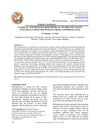 45 citations,
May 2003 in “Journal of Cell Science”
45 citations,
May 2003 in “Journal of Cell Science” α3β1-integrin is crucial for maintaining normal hair follicle shape and function but not needed for the development of the surrounding skin.
 42 citations,
October 2011 in “Seminars in Cell & Developmental Biology”
42 citations,
October 2011 in “Seminars in Cell & Developmental Biology” Eph/ephrin signaling is important for skin cell behavior and could be targeted to treat skin diseases.
 22 citations,
May 2011 in “American Journal of Clinical Dermatology”
22 citations,
May 2011 in “American Journal of Clinical Dermatology” Recognizing and managing skin-related psychiatric disorders in children is crucial for effective treatment.
 16 citations,
July 2012 in “Current pharmaceutical biotechnology”
16 citations,
July 2012 in “Current pharmaceutical biotechnology” New treatments for skin conditions related to the sebaceous gland are being developed based on current research.
 8 citations,
February 2013 in “Central European Journal of Biology”
8 citations,
February 2013 in “Central European Journal of Biology” Melanocytes are diverse cells important for pigmentation and skin health, influenced by genetics and environment.
 6 citations,
September 2022 in “Frontiers in pharmacology”
6 citations,
September 2022 in “Frontiers in pharmacology” Epimedium extract helps increase skin pigmentation and could be a new treatment for conditions with reduced pigmentation.
 1 citations,
January 2023 in “Burns and trauma”
1 citations,
January 2023 in “Burns and trauma” Tiny particles from 3D-grown skin cells speed up wound healing by promoting blood vessel growth.
 January 2023 in “Trakia Journal of Sciences”
January 2023 in “Trakia Journal of Sciences” Goats infested with lice showed anemia and skin issues, which improved after treatment.
 August 2009 in “Expert Review of Dermatology”
August 2009 in “Expert Review of Dermatology” Pregnancy can cause skin changes and conditions that need correct diagnosis and treatment for the health of the mother and baby.
 26 citations,
January 2017 in “Acta dermato-venereologica”
26 citations,
January 2017 in “Acta dermato-venereologica” Antidepressants might help with skin inflammation and improve conditions like psoriasis and eczema.
 13 citations,
December 2012 in “Cells”
13 citations,
December 2012 in “Cells” Targeting the actin cytoskeleton could improve skin healing and reduce scarring.
 1 citations,
November 2020 in “Biochemical Society transactions”
1 citations,
November 2020 in “Biochemical Society transactions” Different types of skin stem cells can change and adapt, which is important for developing new treatments.
 41 citations,
March 1992 in “Archives of Dermatology”
41 citations,
March 1992 in “Archives of Dermatology” The review suggests that understanding and treating the psychological aspect of skin disorders is important and calls for more collaboration in this field.
 13 citations,
August 2005 in “Dermatologic Clinics”
13 citations,
August 2005 in “Dermatologic Clinics” Doctors should consider psychological factors when treating skin conditions and work with mental health experts.
 5 citations,
June 2018 in “Records of Natural Products”
5 citations,
June 2018 in “Records of Natural Products” Garden cress extract may help treat skin inflammation and androgen-related disorders.
 1 citations,
May 2017 in “Asian journal of medical sciences”
1 citations,
May 2017 in “Asian journal of medical sciences” The dietary supplement significantly improved skin, nails, and hair in older adults.
 4 citations,
December 2013 in “Acupuncture and related therapies”
4 citations,
December 2013 in “Acupuncture and related therapies” N-acetyl-cysteine shows promise in treating various diseases and may improve skin and hair conditions, but more research is needed on dosages and long-term effects.
 2 citations,
January 1998 in “Dermatology”
2 citations,
January 1998 in “Dermatology” Stopping forehead irritation and using hydrocortisone helped a man's skin, Martinique has lower melanoma rates, a man had an allergy to a specific antifungal, another had unexplained cysts, certain drugs can cause skin reactions without always being interrelated, a link between Fanconi anemia and a skin condition was suggested, high levels of a certain protein may play a role in a type of psoriasis, and there's a need to study the connection between scalp pain and hair loss.
 6 citations,
May 2022 in “Frontiers in Medicine”
6 citations,
May 2022 in “Frontiers in Medicine” The study suggests pandemic stress might worsen or trigger hair loss problems.
2 citations,
May 2023 in “Frontiers in Pharmacology” Natural products may help treat skin inflammation from abnormal adrenal hormones.
 1160 citations,
November 2018 in “Physiological Reviews”
1160 citations,
November 2018 in “Physiological Reviews” The document concludes that better targeted treatments are needed for wound healing, and single-cell technologies may improve cell-based therapies.
 20 citations,
January 2015 in “Current problems in dermatology”
20 citations,
January 2015 in “Current problems in dermatology” Graying hair happens due to aging and might be delayed by new treatments.
 2 citations,
August 2019 in “Journal of skin and stem cell”
2 citations,
August 2019 in “Journal of skin and stem cell” The study concludes that regulating apoptosis could lead to new treatments for various skin and hair conditions.
 January 2020 in “Asian journal of applied science and technology”
January 2020 in “Asian journal of applied science and technology” Good nutrition is crucial for health and preventing disease, and supplements can help prevent nutrient deficiencies.
 182 citations,
August 2016 in “Development”
182 citations,
August 2016 in “Development” ATP-dependent chromatin-remodeling complexes are crucial for gene regulation, cell differentiation, and organ development in mammals.
 148 citations,
December 2018 in “Journal of autoimmunity”
148 citations,
December 2018 in “Journal of autoimmunity” Alopecia areata is an autoimmune disease causing patchy hair loss, often with other autoimmune disorders, but its exact causes are unknown.
 42 citations,
December 2016 in “Cell Death & Differentiation”
42 citations,
December 2016 in “Cell Death & Differentiation” Damaging mitochondrial DNA in mice speeds up aging due to increased reactive oxygen species, not through the p53/p21 pathway.
 26 citations,
July 2021 in “Frontiers in Cell and Developmental Biology”
26 citations,
July 2021 in “Frontiers in Cell and Developmental Biology” The review suggests that a special cell-derived treatment shows promise for various skin conditions and hair growth but needs more research for confirmation.
 25 citations,
March 2018 in “Clinics in Dermatology”
25 citations,
March 2018 in “Clinics in Dermatology” Indigenous herbal medicines in the Indian subcontinent have potential for drug development but need more research and standardization.
 13 citations,
September 2019 in “EBioMedicine”
13 citations,
September 2019 in “EBioMedicine” sPLA2-IIA increases growth in hair follicle stem cells and cancer cells, suggesting it could be targeted for hair growth and cancer treatment.





























